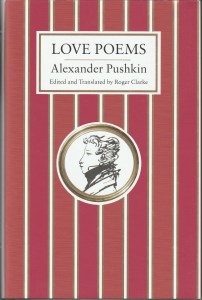 Pushkin’s lyric poetry
Pushkin’s lyric poetryFor Pushkin’s total output of shorter verses see my four volume edition of his Complete Lyrics and Shorter Poems. The scope of this volume is limited to Pushkin’s love poetry, which accounts for les than a quarter of his total output of lyric poetry. From the love poems I have chosen 112 pieces that range across the spectrum of love’s orientations and expressions, from the imaginatively fictional to the starkly real, from playful society bons mots to heartfelt expressions of deepest feeling.
The poems are arranged broadly, but not pedantically, in chronological order of composition. Many of the poems are autobiographical, and they therefore tell a story, the story of Pushkin’s personal and social life and his emotional development, as traceable through his love affairs, real and imagined, from ebullient boyhood, through impetuous youth and more measured maturity, into the regrets and frustrations of middle age. But there are limitations to this approach. In some cases the dating of the poems is conjectural. Also, for understandable reasons, it was rare for Pushkin to name the addressees of his love poems; indeed he often did his best to disguise the true addressees behind pseudonyms or anonymity. Some of Pushkin’s love poetry, particularly in the early years, did not relate to real people at all, but was the construct of his literary interests and imagination. Even when a real woman was the original inspiration for a poem, the facts may have crystallised into something more abstract by the time Pushkin came to writing it down. So the extraction of pure autobiographical fact from a thick overlay of subjective memory and creative inspiration will always remain largely a matter of deduction, intuition and conjecture.
To help fit the poems, whether autobiographical or not, into the framework of Pushkin’s life, a short biography of Pushkin is provided at the back of the volume.
The translations
The Russian texts of the selected poems is available at http://almabooks.com/wp-content/uploads/2017/01/lovepoems.pdf.
Our intention has been to present Pushkin’s poems in a clear and natural modern English, unobscured by archaic or obsolete “poetic” language. This, we felt, would be truest to Pushkin’s own normally direct and informal style, as well as being most accessible to today’s English reader.
Pushkin habitually rhymes all his lines. (There are only two instances of poetry unrhymed by Pushkin in this volume – A Riverbank by Night; and (paradoxically) the one entitled Rhyme.) Fully rhymed English translations are problematical, however. It is much harder to find natural rhymes in English than in Russian. Because of this it is difficult to avoid the struggle for English rhymes distorting the meaning of Pushkin’s original text and forcing the English into unnatural phraseology. Despite this, the present translators have striven to produce faithful and fluent versions that still replicate Pushkin’s rhyme schemes. Witty epigrams will lose their pointedness without rhyme; and unrhymed translations of song-like poems written in regular stanzaic form will not do justice to the formal beauty of Pushkin’s originals. In a minority of cases, however, I have judged that Pushkin’s writing – his stories, his descriptions, his wit, his verve – will come over best to the English reader in unrhymed verse, in the manner of my translation of Ruslán and Lyudmíla.